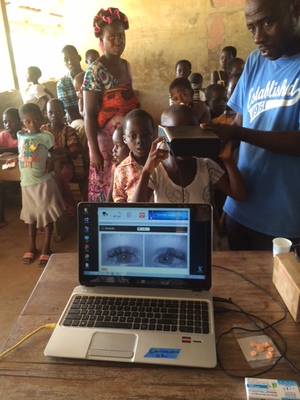Transformative Healthcare–PhaaseID
Patient Health Analysis and Support Environment
Fast, dependable patient identification
Patients are enrolled using a picture of their eyes. The system is easy to use and portable. This photo shows parent volunteers at a malaria screening in their children's school
Patient identification is a difficult problem in West Africa. Most people lack government issued identification; they often have similar names and birthdates are uncertain. A hospital with 100,000 patients may have 1,000,000 charts (due to redundancy) and finding past treatment information is nearly impossible.
PhaaseID solves this problem. As a biometrically-linked health records and vaccination registry database, PhaaseID provides both a bridge between paper charts and electronic medical records, and/or a permanent electronic solution. With PhaaseID, the issue of patient identification and chart redundancy is resolved. It transforms rural health delivery from a one-off clinic visit to a history of care that allows evidence-based medical decisions.
The PhaaseID electronic medical record can maintain all aspects of patient information including physical examination, laboratory results, diagnosis, treatment, and plan for follow-up. PhaaseID includes GPS coordinates and stores both the location where the patient was treated as well as his home village or city. Screens are built with customizable fields for easy entry by a particular facility. These fields include health information as will as ICD codes and other codes unique to the Ghana Health Services system. PhaaseID is ideal for use in short-term clinics, vaccination campaigns, or disease screenings in rural villages. The iris scan instantly creates a permanent record for the patient, regardless of if customary patient identifiers are available. The patient will never be duplicated in the system and health records can be available even when care is sporatic. PhaaseID saves money, improves care, and strengthens relationships between patients and providers.
PhaaseID is well received by the community
PhaaseID is portable, durable, and adaptable. Screens are designed for ease of entry, with fields that are appropriate for the local culture and easily tailored to the religious, ethnic, or traditional needs of the community.
PhaaseID transforms rural health delivery from a one-off clinic visit to a history of care that improves results and strengthens relationships between patients and providers.


